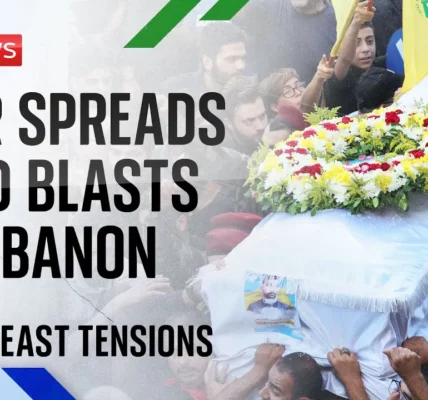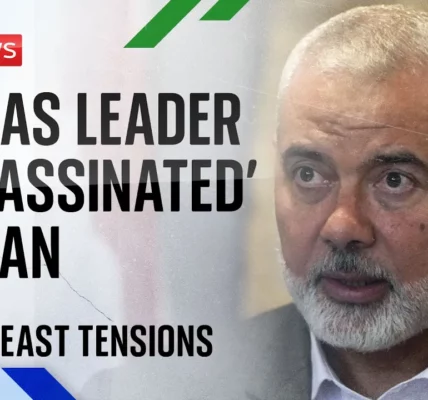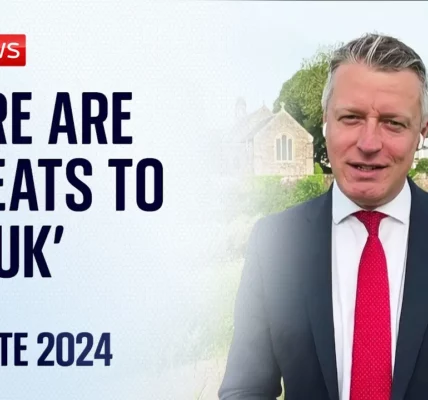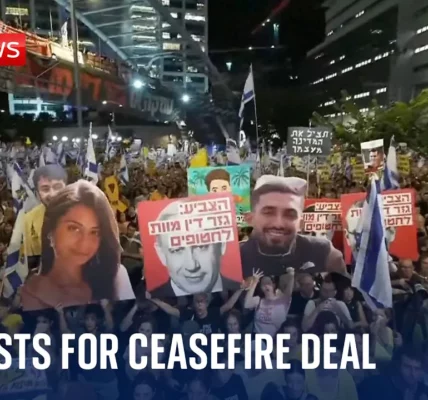Escalating Conflict: Israel’s Attacks on Hezbollah and the Humanitarian Crisis in Lebanon

This article delves into the ongoing conflict between Israel and Hezbollah, highlighting the humanitarian implications for Lebanon, the responses from global leaders, and the political landscape in the UK as it reacts to these developments.
Introduction
The conflict in the Middle East has once again intensified, with Israel launching a series of airstrikes against Hezbollah targets in Lebanon. This has led to a significant humanitarian crisis as thousands of civilians flee the violence. The situation has escalated to alarming levels, prompting international concerns and diplomatic discussions. As the conflict unfolds, the implications for both the region and global politics become increasingly complex.
Current Situation in Lebanon
As of recent reports, Israel has vowed to continue its military operations against Hezbollah, particularly after the death of a senior commander in an airstrike. The escalation of violence has resulted in a mass exodus of civilians from southern Lebanon, with reports indicating that tens of thousands are now displaced.
Impact of Airstrikes
Israeli airstrikes have targeted various locations across Lebanon, including residential areas and known Hezbollah strongholds. The Israeli Defense Forces (IDF) claim these strikes are aimed at disrupting Hezbollah’s missile capabilities. The humanitarian toll is severe:
- Thousands displaced, with many seeking refuge in makeshift shelters.
- Emergency services overwhelmed by the number of casualties and the urgent need for basic supplies.
- Increased tensions as civilians express anger towards the ongoing violence.
International Reactions and Diplomatic Efforts
In response to the escalating conflict, global leaders are urging for a diplomatic resolution. President Biden has emphasized that a full-scale war is not in anyone’s interests and that diplomatic avenues should still be pursued.
US Stance on the Conflict
President Biden’s administration has reiterated its commitment to a peaceful resolution. Key points include:
- The necessity of adhering to UN Security Council Resolution 1701, which calls for the disarmament of militias in Lebanon.
- Support for humanitarian aid to civilians affected by the conflict.
- Encouragement for both Israel and Hezbollah to de-escalate military actions.
Hezbollah’s Response
Hezbollah has maintained its position of resistance against Israeli actions, launching counter-attacks into northern Israel. The ongoing hostilities have made the prospects for peace increasingly tenuous, and the humanitarian crisis is deepening as civilians bear the brunt of the conflict.
Political Implications in the UK
As the situation in Lebanon unfolds, political leaders in the UK are grappling with the implications of the conflict. Labor leader K. Starmer has addressed the situation at the party’s conference, emphasizing the need for strong leadership in the face of international crises.
Starmer’s Address
In his address, Starmer sought to outline a vision for a united Britain that can effectively respond to global challenges:
- Commitment to rebuilding Britain post-pandemic.
- Calls for unity in addressing international crises, including the conflict in the Middle East.
- Promotion of policies aimed at improving the lives of working-class citizens.
Public Sentiment
Public opinion in the UK is mixed as citizens react to the government’s stance on the conflict. Many are concerned about the implications of the violence in Lebanon and how it reflects on Britain’s foreign policy.
Conclusion
The conflict between Israel and Hezbollah is not just a regional issue; it has far-reaching implications for global peace and humanitarian efforts. As the situation continues to evolve, it is crucial for international leaders to work towards a diplomatic solution that prioritizes the safety and well-being of civilians. The ongoing humanitarian crisis in Lebanon requires immediate attention and action. As we follow these developments, it is vital for the global community to remain engaged and advocate for peace.
For further updates and insights on this situation, stay tuned to Sky News and engage with the ongoing discussions on social media. Your awareness and advocacy can make a difference.
“`




